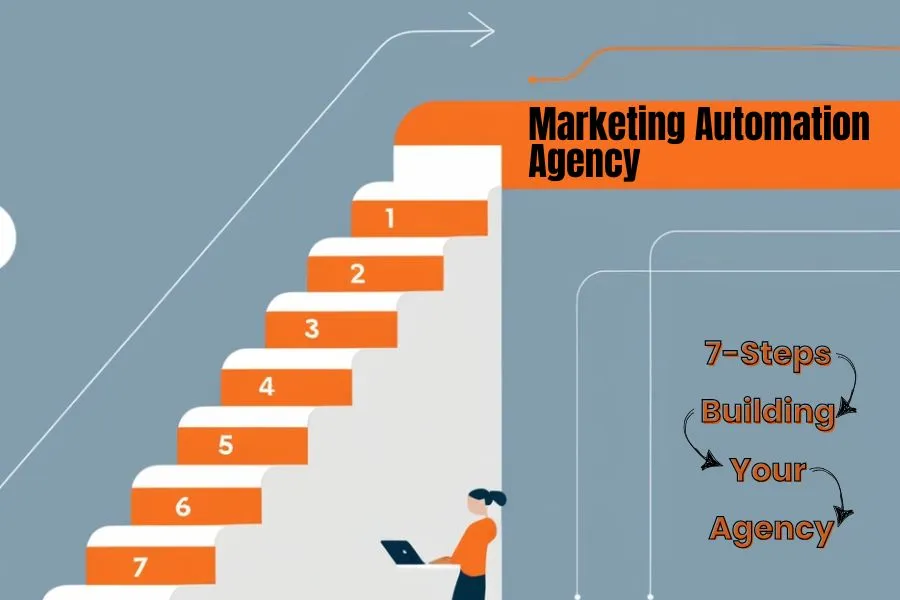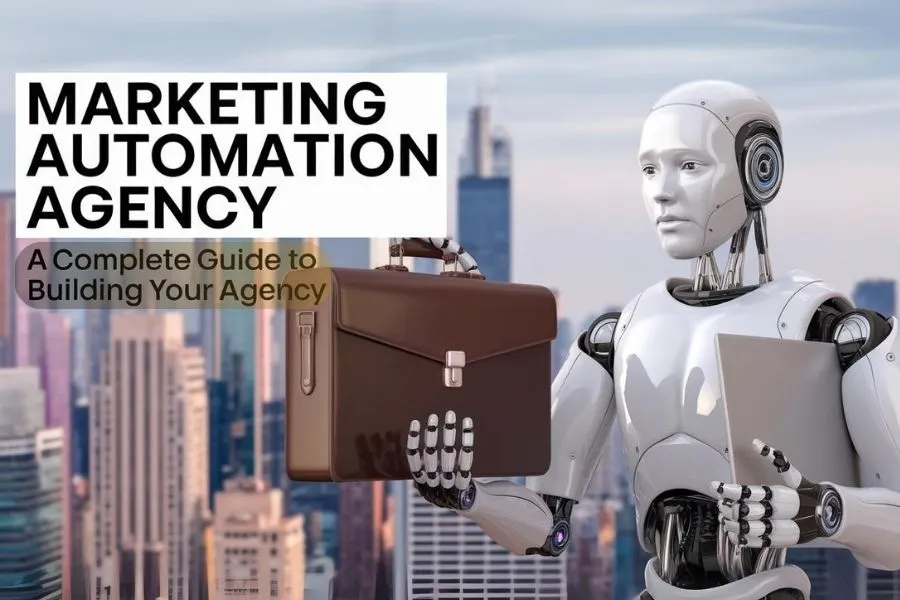Table of Contents
Introduction to Marketing Automation Agency
What Is a Marketing Automation Agency and Why Start One?
A marketing automation agency specializes in using software and data-driven strategies to streamline clients’ marketing efforts. This agency automates repetitive marketing tasks like email campaigns, social media posts, and data analysis, allowing businesses to focus on growth. As companies increasingly seek automation to boost efficiency and customer engagement, starting a marketing automation agency has become a promising entrepreneurial opportunity.
Understanding the Demand for Marketing Automation Services
Marketing automation become a necessity for businesses. According to a 2023 survey, over 76% of companies use some form of automation to improve marketing efficiency. This demand creates a ripe market for agencies offering well-rounded automation services.
Marketing Automation Agency: 7 Steps to Building Your Agency

1. Laying the Foundation
Researching the Market: Key Trends and Competitors
Before launching your agency, it’s crucial to understand the current landscape. Conduct thorough market research to identify:
- Emerging Trends: Stay ahead of the curve by keeping an eye on trends like AI-driven personalization, data privacy regulations, and advanced lead nurturing.
- Competitive Analysis: Analyze your competitors’ strengths, weaknesses, and unique selling propositions. This will help you differentiate your agency.
Defining Your Niche and Unique Selling Proposition
- Niche Specialization: Focus on a specific niche within marketing automation, such as e-commerce automation, B2B lead nurturing, or social media automation.
- Unique Selling Proposition: Develop a strong USP that sets you apart. For instance, you could offer fully customized workflows, specialized CRM integrations, or advanced analytics capabilities.
Example:
- Niche: E-commerce Automation
- USP: AI-Powered Personalized Product Recommendations and Cart Abandonment Recovery
Creating a Business Plan for Your Marketing Automation Agency
A well-structured business plan is essential for the success of your agency. Your plan should include:
- Financial Projections: Outline your startup costs, revenue projections, and profitability goals.
- Target Market: Identify your ideal clients, such as small businesses, mid-market companies, or enterprise organizations.
- Service Offerings: Clearly define the services you will provide, including marketing automation setup, campaign management, and analytics.
- Marketing and Sales Strategy: Develop a comprehensive marketing and sales plan to attract and acquire clients.
- Team and Operations: Outline your team structure and operational processes, including project management and client onboarding.
2. Setting Up Essential Tools and Technology
Choosing the Right Automation Tools and Software
Tailor to Your Niche: Different industries have unique needs. Consider tools like HubSpot, ActiveCampaign, and Marketo, each with its strengths.
Key Features: Look for flexibility, scalability, and seamless integration with other tools.
Example: A B2B tech agency might choose HubSpot for its robust CRM and lead nurturing features, while an e-commerce agency might opt for ActiveCampaign’s advanced email marketing capabilities.
Building a Tech Stack to Deliver Efficient Services
Core Components: A solid tech stack typically includes:
- CRM: For managing customer relationships.
- Email Marketing: For leads and drive best conversions.
- Social Media Scheduling: To maintain a consistent online presence.
- Analytics: To measure performance and make data-driven decisions.
Customizing Your Setup: The exact tools will vary based on your clients’ specific requirements.
Example: A digital marketing agency serving small businesses might use a combination of HubSpot, Mailchimp, Buffer, and Google Analytics to provide a comprehensive suite of services.
3. Building Your Team and Skills
Key Skills Needed to Succeed in Marketing Automation
To effectively implement marketing automation, your team needs a blend of technical and strategic skills. Consider these essential competencies:
- Data Analysis: The ability to extract insights from data to inform marketing decisions.
- Example: Analyzing email open rates to identify the most effective subject lines.
- Content Marketing: Create high quality content for target audience.
- Example: Developing a series of email newsletters to nurture leads.
- Customer Journey Mapping: Understanding customer interactions and optimizing touchpoints.
- Example: Mapping out a customer’s journey from initial website visit to purchase.
- Software Integration: Seamlessly connecting marketing automation tools with other systems.
- Example: Integrating your CRM with your email marketing platform.
- Troubleshooting: Identifying and resolving technical issues.
- Example: Fixing a broken email campaign that isn’t sending to subscribers.
4. Developing Service Offerings
Essential Services to Offer as a Marketing Automation Agency
To establish your agency as a comprehensive marketing automation solution, consider offering these essential services:
- Lead Scoring: Prioritize leads based on their potential value, ensuring your sales team focuses on the most promising opportunities.
- Email Campaign Automation: Create personalized, targeted email campaigns that nurture leads, drive conversions, and foster customer loyalty.
- CRM Management: Optimize your customer relationship management system to streamline processes, improve customer interactions, and gain valuable insights.
- Social Media Scheduling: Efficiently plan and execute social media campaigns across multiple platforms, saving time and maximizing reach.
Creating Packages: Tailoring Services for Different Clients
To cater to diverse client needs, develop flexible service packages. Here’s an example:
| Startup Package: Basic CRM setup and configuration. Email marketing campaign creation and scheduling. Social media scheduling for two platforms. Monthly reporting and analytics. | Growth Package: Advanced lead scoring and segmentation. Automated email workflows and drip campaigns. In-depth CRM management and optimization. Social media content creation and A/B testing. Comprehensive performance reporting and analysis. | Enterprise Package: Custom marketing automation solutions tailored to specific business goals. Advanced analytics and predictive modeling. Dedicated account manager for personalized support. Integration with other sales tools & marketing. |
How to Price Marketing Automation Services
When setting your pricing, consider the following factors:
- Service Complexity: More complex services, such as custom integrations or advanced analytics, can command higher rates.
- Expertise and Experience: Your agency’s reputation and track record will influence your pricing.
- Value Proposition: Clearly articulate the value your services deliver to clients, justifying your pricing.
For instance, a basic startup package might start at $1,000 per month, while a comprehensive enterprise solution could cost $5,000 or more. Ultimately, the price should reflect the time, resources, and expertise required to deliver exceptional results.
5. Attracting and Retaining Clients
Client Acquisition
- Inbound Marketing: Implement inbound marketing strategies like blogging, SEO, and social media to attract potential clients.
- Networking: For best networking attend events to build relationships with clients.
- Targeted Outreach: Identify ideal clients and reach out to them directly with personalized messages.
Example:
- Content Marketing: Create high-quality blog posts on topics relevant to your target audience, such as “How to Automate Your Marketing Workflow for Maximum Efficiency.”
- Social Media: Share valuable content on platforms like LinkedIn and Twitter, engage with industry influencers, and join relevant groups.
- Networking Events: Attend marketing conferences and workshops to connect with other professionals and potential clients.
Client Retention
- Personalized Communication: Regularly check in with clients, send personalized performance reports, and offer proactive advice.
- Value-Added Services: Provide additional services like training or consulting to increase client satisfaction.
- Strong Client Relationships: Build trust and loyalty by consistently delivering on promises and exceeding expectations.
Example:
- Quarterly Business Reviews: Conduct quarterly reviews with clients to discuss their goals, challenges, and upcoming projects.
- Customized Marketing Plans: Develop tailored marketing plans based on each client’s specific needs and objectives.
- Proactive Support: Offer timely support and assistance, such as troubleshooting technical issues or answering questions.
6. Marketing Your Agency
Using Digital Marketing to Promote Your Automation Agency
A strong online presence is vital. Use SEO to increase your site’s visibility, and consider paid ads for faster results. Social media platforms, especially LinkedIn, are great for networking and showcasing client success stories.
Building a Strong Online Presence and Brand
Invest in a professional website and create valuable content, such as blogs and case studies, to establish your expertise. Consistent branding across all digital channels enhances credibility.
7. Managing Operations and Scaling Up
Setting Up Processes and Workflows for Efficiency
- Standardize Processes: Establish clear, repeatable workflows to minimize errors and maximize efficiency.
- Leverage Technology: Utilize project management tools like Asana or Trello to organize tasks, track progress, and improve collaboration.
- Automate Reporting: Employ automated reporting tools to generate regular updates for clients, freeing up valuable time for strategic tasks.
Measuring Success: Key Metrics for Marketing Automation Agencies
Performance Indicators (KPIs): Monitor critical metrics such as conversion rates, cost per lead, and ROI to assess campaign effectiveness.
Data-Driven Decisions: Use data insights to identify areas for improvement and optimize future strategies.
Conclusion
Building a Sustainable and Profitable Marketing Automation Agency
Starting a marketing automation agency requires dedication and strategic planning. By establishing strong foundations, creating tailored service offerings, and staying adaptive, you can build a profitable business in this high-demand field.
Key Takeaways: Your Roadmap to Success in Marketing Automation
In summary, success in marketing automation requires expertise, a client-centric approach, and consistent improvement. Stay focused, provide value, and watch your agency thrive.
FAQs
1. What does a marketing automation agency do?
A marketing automation agency uses technology to automate marketing tasks, helping businesses improve efficiency and customer engagement.
2. How much does it cost to start a marketing automation agency?
The cost depends on the tools, team, and resources you choose, but starting costs can range from a few thousand dollars to more than $10,000.
3. What are the best tools for marketing automation?
Popular tools include HubSpot, ActiveCampaign, and Marketo, each offering unique features that can be customized based on client needs.
4. How can I attract clients to my marketing automation agency?
Attract clients through digital marketing, networking, and showcasing case studies that demonstrate your expertise and results.
5. How can I scale my marketing automation agency?
To scale, consider expanding your team, increasing services, or niching down to attract premium clients and manage resources effectively.

